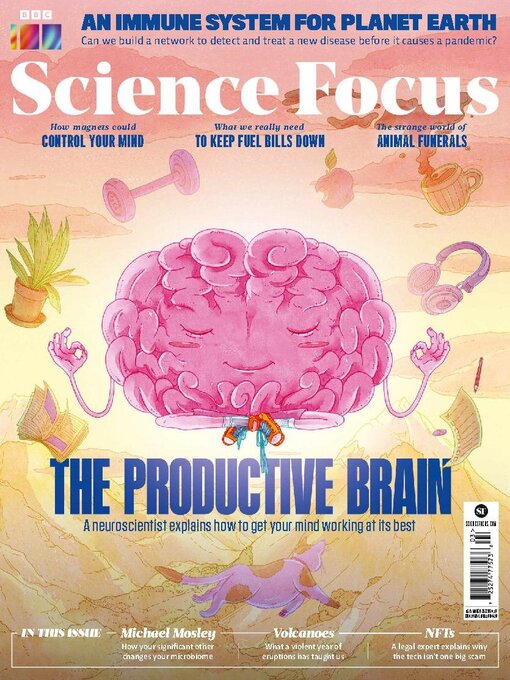With accessible features illustrated with the world’s best photography, BBC Focus Magazine explains the theory behind scientific phenomena and really brings science to life. In every issue you’ll find news of the latest major scientific developments, a lively Q&A section plus exclusive and astonishing photographic reports that range from the breathtaking to the downright odd.
FROM THE EDITOR
ON THE BBC THIS MONTH...
CONTRIBUTORS
EYE OPENER
CONVERSATION • YOUR OPINIONS ON SCIENCE, TECHNOLOGY AND BBC SCIENCE FOCUS
LETTER OF THE MONTH
Focus BBC
HOW CAN WE SOLVE THE SPACE JUNK PROBLEM? • Recent news of an out-of-control rocket crashing into the Moon sounds dramatic, but it’s the millions of pieces of smaller debris that present the real danger, according to a UK expert
SPACE JUNK IN NUMBERS
Cyanide may have played a key role in the origin of life on Earth, and could help us find alien life • The chemical may drive reactions that produce organic molecules
Chimps seen treating each other’s wounds using ‘medicinal’ insects • The behaviour suggests that the apes are capable of a feeling similar to empathy
Fusion energy one step closer after Oxford reactor breaks record • UK-based JET facility has more than doubled the world record for nuclear fusion energy generation set in 1997
Nature lover? It may be written in your genes • A study of more than 1,000 sets of twins suggests that affinity for natural spaces is partially inherited from parents
New perspective of black hole confirms 30-year-old prediction • Observations by Europe’s Very Large Telescope could help us to shed light on the history of the Milky Way
Specific neurons in your brain only light up when you hear singing • Neuroscientists hope to learn more about what aspects of singing cause these neurons to respond in this way, building on earlier work investigating the relationship between music and the human brain
Fixing a broken heart
Using magnets to influence the brain could lead to revolutionary new depression treatment • The method, tested in rats, targets star-shaped brain cells called astrocytes. Neuroscientists Dr Yichao Yu and Prof Mark Lythgoe at University College London tell us more…
THE INTERNATIONAL SPACE STATION: WHY IS IT BEING RETIRED AND WHAT WILL HAPPEN TO IT? • The last decade of the ageing space station’s life will feature private occupants, movies and an eventual watery grave
LONDON TUBE: DOES ITS AIR HARM YOUR HEALTH? • The Mayor of London hopes that 80 per cent of trips in the city will be made on foot, bike or public transport by 2041. But how polluted is the Underground’s air?
RENEWABLE ENERGY: WHY CAN’T IT KEEP UK ENERGY PRICES DOWN? • Huge increases in gas prices have sent UK bills skyrocketing. Can green energy offer a solution?
SMART TRANSFORMERS
INNOVATIONS • PREPARE YOURSELF FOR TOMORROW
Are NFTs really the future of society? • Alex Hughes spoke to blockchain expert Merav Ozair to find out whether NFTs are just a gimmick, or essential future tech
Ideas we like…
A MOST VIOLENT YEAR
YOUR PRODUCTIVE BRAIN • Increasing your productivity is easy. It’s just a matter of making a few simple changes to your routine, or behaviour, or thinking, and your productivity will soar. At least, that’s what countless online articles claim. The actual science tells a different story. Even a modest amount of research reveals that some of the most commonly touted claims about how to boost productivity fall apart in the face of the evidence. So, here are some of the most common myths around boosting productivity, along with a number of approaches that have a more robust scientific basis.
YOU, ME AND OUR MICROBES • Why you are more like your...

